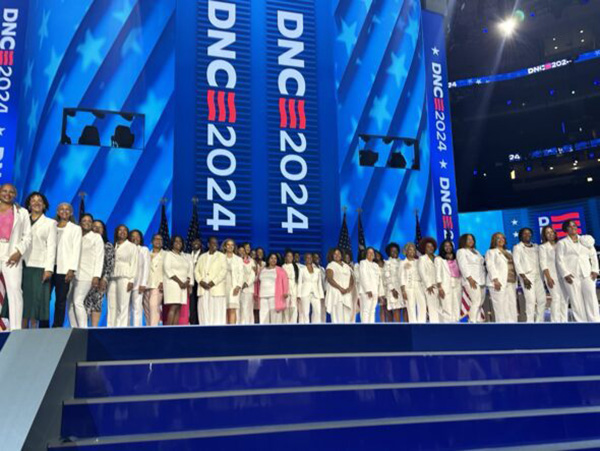In 2024, Black Americans encountered a series of political events that tested their resilience and commitment to justice. From court rulings affecting civil rights to landmark political milestones, 2024 was a year of challenges and pivotal achievements.
Vice President Kamala Harris made history as the first Black woman to lead a major party’s presidential ticket. Most experts viewed her nomination as a breakthrough in representation and a continuation of the fight for equity. Harris’ campaign, which didn’t begin until President Joe Biden dropped out of the race in July, focused on protecting voting rights, promoting economic justice, and addressing racial inequities.
Despite those efforts, the 2024 election resulted in Donald Trump’s return to the White House. His campaign rallies were marred by controversy, including appearances in former sundown towns and speeches at Madison Square Garden laced with racially charged rhetoric. The return of Trump to power stunned pundits and raised alarms within Black communities about civil rights protections.
“Trump’s rhetoric is dangerous, and his choice of venues speaks volumes,” said Dr. Benjamin F. Chavis, Jr., president of the National Newspaper Publishers Association.
Trump still was convicted on 34 counts of falsifying business records in a New York hush money trial, making him the first U.S. president ever convicted of a felony. The conviction meant little, as did the more than 50 other charges, as Trump still won the presidential election.
Project 2025, a 900-page ultra-conservative roadmap drafted by Trump allies, details plans to restructure the U.S. government in ways that could severely impact Black Americans. The Legal Defense Fund (LDF) released an in-depth analysis showing how Project 2025 would weaken anti-discrimination laws, dismantle the Department of Education, threaten Black political power, and exacerbate health disparities.
“The most important part of the report is how Project 2025 will have an impact on individual lives and how those individual lives will be upended through the policy proposals,” Karla McKanders, director of the LDF’s Thurgood Marshall Institute, said.
The report warned that dismantling the Department of Education would harm programs like Head Start, where 28% of enrollees are Black children, and cutting Pell Grants would disproportionately affect Black college students. The plan also recommends replacing career civil servants with political appointees, which could undermine the integrity of agencies like the Census Bureau and result in undercounting Black communities, impacting political representation and federal funding.
The dismantling of agencies like the EPA and FEMA would leave Black communities vulnerable to environmental disasters. “The resources that the federal government provides when there’s a natural disaster are instrumental in getting communities back on their feet,” McKanders said.
The Supreme Court’s ruling in Students for Fair Admissions v. Harvard dismantled affirmative action policies in higher education, igniting a wave of state and corporate rollbacks targeting diversity, equity, and inclusion (DEI) initiatives. In the months that followed, legislative efforts and legal challenges have accelerated the dismantling of these programs, further showing that opportunities for Black and Brown communities are being systematically eroded.
In Florida, Gov. Ron DeSantis signed legislation banning the use of state funds for DEI programs in public universities, leading to the immediate closure of DEI offices and the cancellation of diversity-related initiatives. Texas quickly followed suit, eliminating diversity offices and mandatory diversity training, mandating that hiring practices in public institutions remain “color-blind and sex-neutral.” Alabama joined the effort by shutting down DEI offices at its public universities, enforcing laws that prohibit the teaching of so-called “divisive concepts” regarding race or sex.
Legal battles in the private sector have mirrored these state-level rollbacks. The Fearless Fund, which provides grants to businesses owned by women of color, was forced to suspend its operations after a federal appeals court ruled the program may violate civil rights laws. The lawsuit, brought by Trump-backed conservative legal groups, claims the fund’s mission of supporting minority women discriminates against other races. The case has set a troubling precedent, signaling that diversity-focused business initiatives could be vulnerable to similar challenges.
Corporate DEI programs are also facing intense scrutiny. Southwest Airlines recently faced legal action over a program that offered free flights to Hispanic students, with a lawsuit alleging the program discriminated against non-Hispanic students. Boeing encountered resistance when a judge rejected its plea deal in a separate case, raising concerns about the company’s commitment to diversity in selecting a compliance monitor. Once an industry leader in DEI, Walmart announced a rollback of its diversity policies, opting to abandon practices prioritizing suppliers based on race or gender to avoid potential litigation.
Civil Rights leaders said the erosion of DEI policies reflects a broader movement aimed at reversing gains made in racial and gender equity since the civil rights era. The rollbacks, framed by their proponents as efforts to ensure fairness, have drawn sharp criticism from advocates who view them as deliberate attempts to undermine progress.
“Without affirmative action, Black and Brown students face higher barriers to entry. These rollbacks are designed to push us backward,” said NAACP President Derrick Johnson.
Civil rights attorney Ben Crump has remained at the forefront of the fight for accountability in 2024, securing justice in several significant police misconduct cases and advocating for systemic reforms.
In June 2024, Crump secured a historic $45 million settlement for Richard ‘Randy’ Cox, a Black man left paralyzed from the chest down after an arrest by New Haven police officers in Connecticut. This settlement is the largest ever recorded in a police misconduct case, surpassing the previous record set in the case of George Floyd.
Crump also represented the family of Tyre Nichols, a 29-year-old Black man who died in January 2023 after being beaten by Memphis police officers during a traffic stop. In October 2024, three former Memphis police officers were convicted of obstruction of justice in federal court, though they were acquitted on the most serious civil rights charges.
In November, Crump led the legal effort that resulted in a $98.65 million jury verdict in a federal civil lawsuit against former Dallas police officer Amber Guyger for the 2018 killing of Botham Jean in his own apartment. Crump called the verdict a powerful testament to Botham’s life and the profound injustice of his death, pointing to critical issues of racial bias and police accountability.
Crump continued his advocacy by representing other victims of police misconduct in 2024. He sought transparency in the case of Roger Fortson, a 23-year-old Black U.S. Air Force airman fatally shot by a Florida deputy in his apartment, noting a witness’s claim that police entered the wrong apartment. In another case, he pursued justice for the family of Sonya Massey, a Black woman shot and killed in her home by an Illinois deputy after she called 911 to report a prowler. Crump also took on the case of D’Vontaye Mitchell, a Milwaukee man who died after being restrained by hotel security guards, demanding accountability for the excessive use of force.
“We can’t allow these injustices to become normalized,” Crump said. “Every fight, every case, is about ensuring that we live up to the promise of equal justice under the law.” Meanwhile, in United States v. Texas, the Supreme Court allowed Texas officials to arrest and deport migrants, which raised more concerns about state overreach.
Former Mississippi sheriff’s deputy Hunter Edward was sentenced to 20 years in prison for torturing two Black men in January 2023, a rare case of accountability for racial violence.
Fulton County District Attorney Fani Willis remained at the forefront of efforts to hold Donald Trump accountable for alleged election interference in Georgia. Despite political pressure and threats, Willis won re-election in November. However, a Georgia appellate court in December disqualified Willis from the case.
The Congressional Black Caucus (CBC) grew to a record 62 members, enhancing its legislative influence. The CBC also honored Shirley Chisholm, the first Black woman in Congress, for paving the way for current and future generations.
Tragedy struck with the death of long-serving U.S. Rep. Sheila Jackson Lee in July 2024 from pancreatic cancer. During her 15 terms representing Texas’s 18th district, Jackson Lee was known for her fierce advocacy on civil rights, health care, and criminal justice reform. Her daughter, Erica Lee Carter, was elected to fill her seat, continuing her mother’s legacy.
Baltimore Mayor Brandon Scott was re-elected for a second term, affirming community support for his public safety and youth development initiatives. Maryland Gov. Wes Moore issued pardons for over 175,000 individuals with low-level marijuana convictions. He posthumously honored abolitionist Harriet Tubman as a one-star general in the Maryland National Guard on Veterans Day.
In Palm Springs, the city council approved a $5.9 million reparations settlement for Black residents displaced in the 1960s. Gov. Gavin Newsom signed legislation to address the legacy of racial discrimination. “California accepts responsibility for the role we played in promoting, facilitating, and permitting the institution of slavery, as well as its enduring legacy,” Newsom stated.
Neo-Nazi marches in Ohio underscored the rise of extremist movements, while pro-Palestinian protests erupted on college campuses, including a high-profile occupation at Columbia University. Hundreds of students were arrested after New York City officials ordered the dispersal of protests, accusing demonstrators of antisemitism.
“We’re not asking for special treatment. We’re demanding the equal justice that America promises to all,” Crump said.



